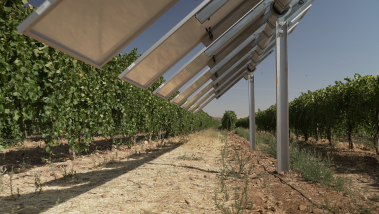#Artificial Intelligence
Artificial Intelligence (AI) is a branch of computer science that enables machines to learn to perform autonomous tasks and make decisions. In renewable energy, AI optimises the use of resources such as wind and sun, adjusting systems in real time to maximise efficiency, reduce waste and ensure constant and sustainable supply.
-
Iberdrola, one of the world’s largest clean energy companies, and Amazon have expanded their long-term global clean power partnership by signing a major renewable energy power purchase agreement (PPA) for 159 MW of East Anglia THREE offshore...
-
Facebook Iberdrola confirms new agreement with Amazon to procure 159 MW of renewable energy from East Anglia THREE, world’s second largest offshore wind farm
-
Twitter Iberdrola confirms new agreement with Amazon to procure 159 MW of renewable energy from East Anglia THREE, world’s second largest offshore wind farm
-
Linkedin Iberdrola confirms new agreement with Amazon to procure 159 MW of renewable energy from East Anglia THREE, world’s second largest offshore wind farm
-
Whatsapp
In recent decades we have witnessed an exciting evolution of artificial intelligence, together with our own social and technological evolution. A path along which different types of artificial intelligence have been developed at the same time as its most varied applications have been put into practice.
-
-
Iberdrola, through its American subsidiary Avangrid , has launched a pioneering project to test the use of Artificial Intelligence (AI) in inspection work at its substations, using the mobile robot SPOT, modelled on a dog. This initiative,...
BCAM, the Research Center on Applied Mathematics attached to the Basque Government's Department of Education, will collaborate with Iberdrola in the Innovation Data Space (i-DS) project. This collaboration has materialised through the signing...
-
Facebook Iberdrola and BCAM will collaborate on the AI Innovation Data Space project to optimise grids
-
Twitter Iberdrola and BCAM will collaborate on the AI Innovation Data Space project to optimise grids
-
Linkedin Iberdrola and BCAM will collaborate on the AI Innovation Data Space project to optimise grids
-
Whatsapp
-
-
Exploring the fascinating world of artificial intelligence requires, above all, delving into the diversity of its algorithms. From supervised learning, which serves as the basis for recommendation systems, to reinforcement learning – used to improve the response of dialogue systems such as chatbots. Discover the types of algorithms that AI uses to transform our technological environment.
Artificial intelligence, for those who do not use it on a daily basis, seems like a concept typical of great film productions or science fiction books. But the truth is that it is a set of almost century-old concepts that are increasingly present and to which we resort, often without realising it. Find out what artificial intelligence is, what it is for, what its risks and challenges are and what we expect from it in the future.













